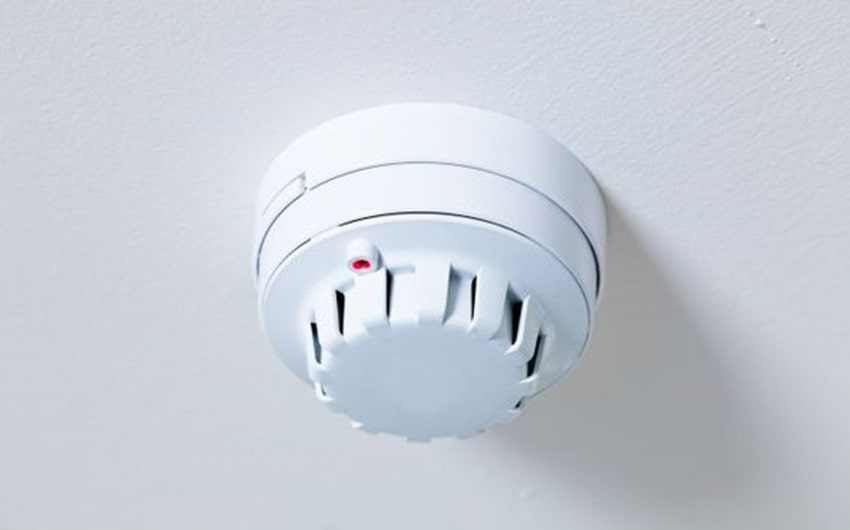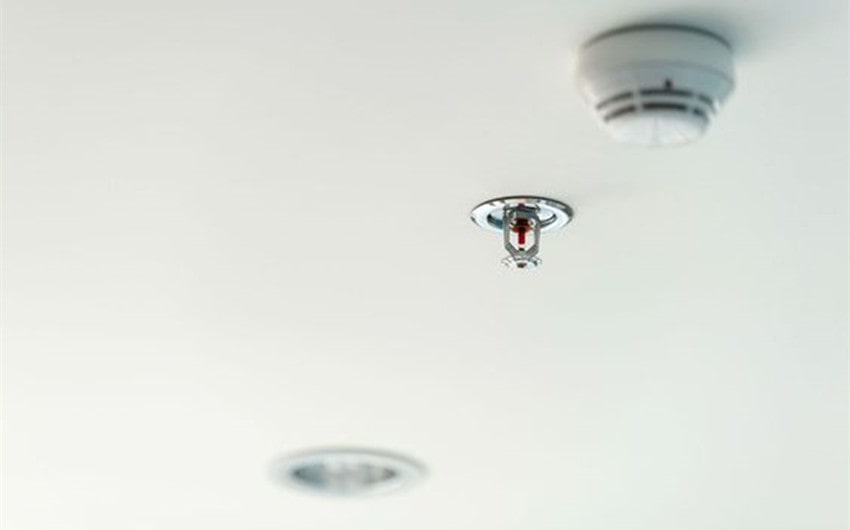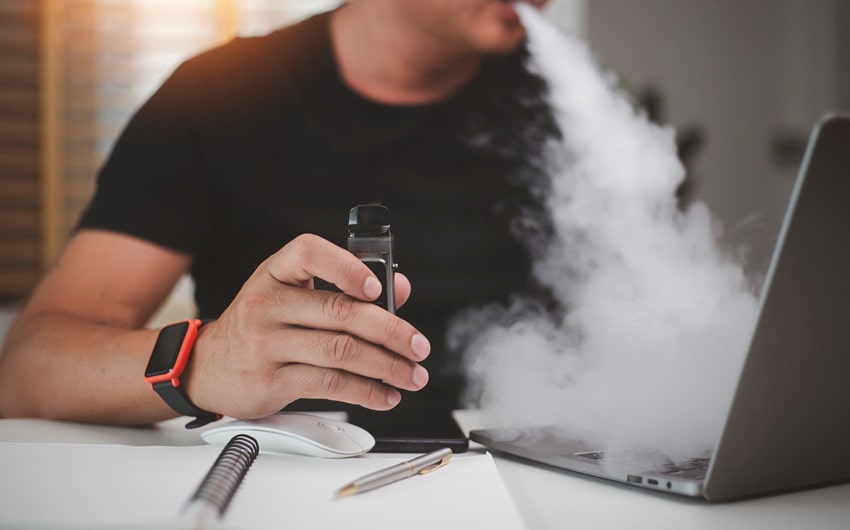Can Smoke Detectors Detect Vape Clouds and Trigger Alarms?
Vaping has become a part of everyday life for many, but if you’re indoors—like at a hotel, school, or airport—you might wonder if your habit could set off a smoke detector. So, can smoke detectors detect vape? The answer is yes, in some cases. Certain detectors, especially photoelectric models, can sense the particles in vapor, mistaking them for smoke.
Whether you’re vaping at home or in public, knowing how detectors work can help you avoid unexpected alarms and the trouble that follows. Let’s dive into when and where vaping might trigger them and how to stay mindful in shared spaces.
How Smoke Detectors Work
Smoke detectors play a crucial role in safety by sensing smoke particles and triggering alarms to alert people of potential fires. There are two main types of smoke detectors, and each works differently:
Ionization Detectors
These detectors are more sensitive to smaller particles from fast-burning fires, like those from paper or gasoline. They use a small amount of radioactive material to create a current between two electrically charged plates. When smoke or other particles interrupt the current, the alarm goes off. However, ionization detectors are less sensitive to larger particles, meaning they are less likely to detect vape clouds unless the vapor is very dense.
Photoelectric Detectors
Photoelectric detectors use a light beam inside a sensing chamber. When smoke or other particles enter the chamber, they scatter the light, which triggers the alarm. Since vapor particles are larger and can block or scatter light, these detectors are more likely to respond to vape, especially if the vapor cloud is thick or close to the detector.
Combination Detectors
Some smoke detectors use both ionization and photoelectric technology to cover a broader range of fire types and particles. These models offer the highest sensitivity but may also be more prone to false alarms, including from vape clouds in some situations.
Advanced Detectors with Laser Sensors
In spaces like airports and schools, advanced detectors with laser or particle sensors are used. These detectors are designed to identify even small changes in the air, making them more likely to pick up vapor particles, mistaking them for smoke.
Can Smoke Detectors Detect Vape?

The simple answer is yes—some smoke detectors can detect vape, though it depends on the type and sensitivity of the detector. Photoelectric detectors are more likely to trigger an alarm from vapor, as the larger particles in vape clouds resemble smoke in how they scatter light. Ionization detectors, on the other hand, are less sensitive to vapor, meaning they are less likely to be set off unless the vapor is exceptionally thick or blown directly into the detector.
The location and environment also matter. In hotels, schools, and airplanes, where sensitive or advanced detectors are installed, even small vape clouds could trigger alarms. That’s why some public places enforce strict no-vaping policies, as triggering an alarm can cause evacuations or security responses. To avoid triggering smoke detectors, it’s recommended to vape near open windows or vents, away from detectors, especially in places with strict rules.
While it’s not guaranteed that vaping will always set off an alarm, understanding how detectors work can help you stay cautious and avoid unnecessary trouble.
Where Vape is Likely to Trigger Smoke Detectors

Image source: Pinterest
Understanding where vaping might set off smoke detectors can help you avoid triggering unnecessary alarms. Different spaces have varying types of detectors, some more sensitive than others. Here’s a breakdown of common places where vaping is likely to trigger smoke alarms and what you should know.
Hotels and Vacation Rentals
Hotels typically install smoke detectors to ensure guest safety, often using a combination of ionization and photoelectric detectors. Some upscale hotels even have advanced particle-detection systems, which can easily mistake dense vapor for smoke. Vaping in hotel rooms could trigger an alarm, leading to fines, extra fees, or eviction from the premises. Some hotels explicitly ban vaping to avoid these issues, while others allow it only in designated smoking areas.
Tips:
- If vaping is allowed, use the bathroom with the exhaust fan running.
- Open windows to disperse vapor quickly.
- Avoid vaping under or near detectors.
Schools and Dormitories
Schools, colleges, and dormitories often have highly sensitive smoke detectors, especially in rooms and common areas, to maintain a smoke-free environment. Some institutions use laser-based or advanced particle sensors that detect any airborne particles, including vapor. Since schools have strict policies on both smoking and vaping, triggering a smoke alarm may result in disciplinary action or fines.
Tips:
- Always check school policies about vaping, as many campuses have zero-tolerance rules.
- If vaping is prohibited, find off-campus areas where it is permitted.
Airplanes and Airports
Airplanes and airport facilities are equipped with highly sensitive air-quality monitoring systems. Even small amounts of vapor in the cabin or bathrooms could trigger alarms, which can result in serious consequences, such as fines or legal action. Airlines have strict no-vaping policies, and triggering an alarm can cause disruptions or even flight delays.
Tips:
- Avoid vaping in airplane bathrooms or restricted areas.
- Wait until you’re outside airport premises, as many airports have designated smoking areas outside the terminal.
Offices and Shared Workspaces
Many modern offices are now equipped with smart smoke detectors to monitor air quality and ensure workplace safety. Even though these detectors are more sensitive to smoke than vapor, thick vape clouds can still cause a false alarm. Additionally, many workplaces have policies banning vaping indoors to prevent distractions or discomfort among employees.
Tips:
- If your workplace allows vaping, use designated outdoor areas or vape near open windows.
- Keep vape clouds small to reduce the chance of setting off an alarm.
Do Fire Sprinklers Get Triggered by Vape?

Image source: Pinterest
Many people worry not just about smoke detectors, but also whether fire sprinklers could be set off by vaping indoors. Fortunately, the good news is that fire sprinklers are not activated by vapor or smoke alone. These systems are designed to respond to extreme heat, not particles in the air.
Here’s how fire sprinklers work:
- Heat-Activated Mechanism: Each sprinkler head contains a glass bulb or a metal link filled with heat-sensitive liquid. When the temperature near the sprinkler reaches around 135°F to 165°F (57°C to 74°C), the liquid expands or the link melts, releasing water to extinguish a fire.
- Independent Activation: Contrary to popular belief, sprinklers do not all activate at once. Only the sprinklers near the heat source will activate, preventing unnecessary flooding in other areas.
Can Vape Clouds Affect Fire Sprinklers?
Since sprinklers only respond to heat, vape clouds will not trigger them. Even dense clouds from a vape cannot affect the glass bulb or heat-sensitive mechanism within the sprinkler. However, if the vapor is blown directly at a smoke detector (which is separate from the sprinkler system), it could trigger an alarm, causing a fire response and confusion.
In summary, fire sprinklers will not trigger from vape clouds, as they are heat-sensitive devices. However, it’s essential to stay mindful of smoke detectors, which are often placed near sprinklers and are more likely to react to vapor. Following rules in public spaces ensures you avoid unnecessary alarms and disruptions.







